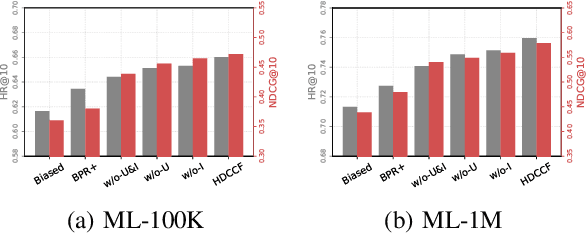Trading Hard Negatives and True Negatives: A Debiased Contrastive Collaborative Filtering Approach
Paper and Code
Apr 25, 2022



Collaborative filtering (CF), as a standard method for recommendation with implicit feedback, tackles a semi-supervised learning problem where most interaction data are unobserved. Such a nature makes existing approaches highly rely on mining negatives for providing correct training signals. However, mining proper negatives is not a free lunch, encountering with a tricky trade-off between mining informative hard negatives and avoiding false ones. We devise a new approach named as Hardness-Aware Debiased Contrastive Collaborative Filtering (HDCCF) to resolve the dilemma. It could sufficiently explore hard negatives from two-fold aspects: 1) adaptively sharpening the gradients of harder instances through a set-wise objective, and 2) implicitly leveraging item/user frequency information with a new sampling strategy. To circumvent false negatives, we develop a principled approach to improve the reliability of negative instances and prove that the objective is an unbiased estimation of sampling from the true negative distribution. Extensive experiments demonstrate the superiority of the proposed model over existing CF models and hard negative mining methods.
 Add to Chrome
Add to Chrome Add to Firefox
Add to Firefox Add to Edge
Add to Edge